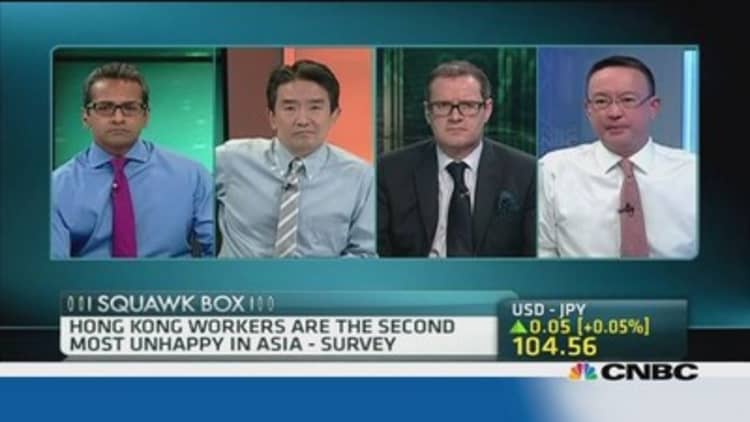
The wealthy city-state of Singapore, which boasts a high quality of life, is also home to Asia's unhappiest employees, according to a new survey, closely followed by rival financial hub Hong Kong.
Twenty-three percent of those polled in the island nation said they did not feel motivated in their current roles and their skills were not being used effectively, the 2013/14 Randstad World of Work Report revealed - a notch higher than Hong Kong where 22 percent of employees were unsatisfied in their jobs.
"Job satisfaction is lowest in the booming finance and business hubs Hong Kong and Singapore, where skilled talent is in short supply and the demands placed on employees are particularly high," recruitment and human resource services provider Randstad wrote in the report published Wednesday. The survey polled over 14,000 professionals across Asia Pacific aged 18-65.
(Read more: From brats to bosses - Gen Y to dominate by 2025)
Three key reasons are causing job dissatisfaction across the region: misalignment with the company culture; difficult bosses; and being asked to do more in a given role without receiving the upskilling required to achieve productivity gains.
Meanwhile, the happiest employees come from countries at opposite ends of the economic development spectrum - India and Australia.
Almost 70 percent of India's employees are very happy in the current jobs, compared with 17 percent in Singapore.
(Read more: This is how fast China's workforce is shrinking)
"Indian professionals appear to be riding a wave of optimism, reflecting how far the nation has come as a global leader in the online business, software and services boom, and the positive outlook for India's future as millions of people climb out of poverty through access to work," Randstad said.
Emphasis on work-life balance
Randstad said a constant theme across the talent pool in Asia is the growing importance of achieving balance between work and life.
After a lack of opportunity for growth and advancement and uncompetitive salaries, stress from poor work-life balances and a lack of flexible work options are the chief reasons employees will leave their jobs, it said.
"The sheer pace of work and the strain of uncertain operating conditions due to slower growth in some countries in the region has taken its toll on employees," the company said.
(Read more: Everybody wins with a healthy work-life balance)


